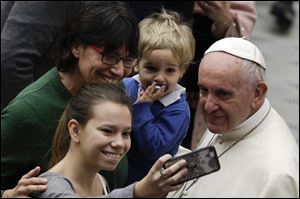
Pope Francis offers indulgence to March for Life participants
1/10/2018
Pope Francis poses for a family picture as he greets faithful during the weekly general audience at the Vatican Jan. 10.
Pope Francis is offering an indulgence — a centuries-old practice involving the cancellation of certain spiritual debts — to any Catholic who attends the annual March for Life against abortion rights in Washington on Jan. 19, and who participates in related acts of piety.
This is believed to be the first time in the 45-year history of the annual march that a pope has offered an indulgence to participants, according to the Archdiocese of Washington. In peak years the march has drawn hundreds of thousands of attendees, many but not all of them Catholics.
The march is held on the National Mall each year to mark the anniversary of the 1973 Roe vs. Wade decision in which the U.S. Supreme Court legalized abortion. This year’s march comes at a time of political strength for abortion opponents, with allies in the Trump Administration and a newly seated conservative Supreme Court justice in Neil Gorsuch.
Pope Francis is offering a “plenary” or full indulgence for participants who are “truly penitential and compelled by charity,” according to an announcement by Cardinal Donald Wuerl of Washington and Bishop Michael Burbidge of neighboring Arlington, Va. The two bishops oversee the places that will host Catholic activities related to the March for Life.
Indulgences are especially associated with medieval piety. Outrage over their sale sparked the 16th century Reformation and an enduring split between Catholics and Protestants. Though no longer for sale, indulgences have remained in practice in modern times. Pope Francis offered them for acts of piety during a “Year of Mercy” in 2016, as his predecessors had done for past “jubilee” years.
Those eligible for this year’s indulgence include all who attend Mass and confession in conjunction with the March for Life, and who pray for causes specified by the Pope, according to the bishops.
The March for Life is an ecumenical and interreligious event, drawing many Protestants and others who don’t share Catholic belief in indulgences or Purgatory.
But the annual gathering also draws heavy Catholic participation both to the main rally and to side events, such as a Mass at St. Matthew’s Cathedral in Washington.
Under Catholic teaching, a “plenary indulgence” enables a recipient to go straight to heaven after death, rather than spending time in Purgatory for further spiritual cleansing. A recipient can also receive such an indulgence on behalf of a deceased loved one. (A “partial” indulgence, in contrast, only accounts for some of the temporal consequences of sin.)
Indulgences do not replace the need for the forgiveness of sins through confession, according to the catechism.
But the church teaches that sin, in addition to needing forgiveness, also has “temporal” effects. People need to repair the damage they did through sin, plus overcome their susceptibility to temptation, according to church teaching. This is done through spiritual discipline on earth or refinement in Purgatory after death.
In 1517, the sale of indulgences stirred outrage in a German monk, Martin Luther, who saw it as a cheap commercialization of piety, and launched the Protestant Reformation. Soon after Luther’s time, the Catholic Church banned the sale of indulgences but affirmed their legitimacy when conferred based on an act of piety.
While the indulgence may revive memories of what divided Catholics and Protestants in the first place, conservatives in both groups have put aside differences to cooperate against abortion rights.
The Block News Alliance consists of The Blade and the Pittsburgh Post-Gazette. Peter Smith is religion editor at the Post-Gazette.
Contact him at: petersmith@post-gazette.com or 412-263-1416; Twitter @PG_PeterSmith.